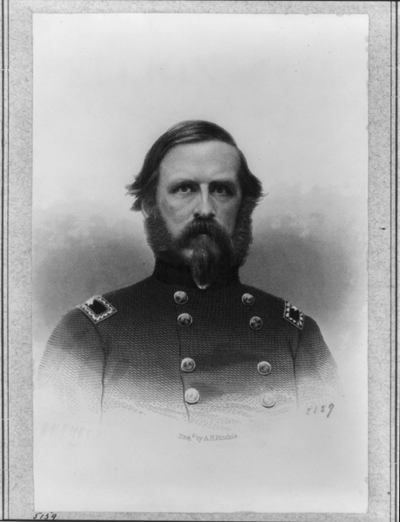Edward Wild
Featured Character – 1863

Edward
Wild
Courtesy of the U.S. Library of
Congress
Born on November 25, 1865 to a
homeopathic doctor, Edward Augustus
Wild graduated from Harvard in 1844.
Two
years later, he received his medical degree from Jefferson
Medical College. During the Crimean War,
Wild, under the name Kholorissy
Bey, served as a surgeon in the Ottoman Army.
At the start of the Civil War, Wild raised a company of
volunteers. Commissioned
as a captain, Wild served in the
1st Massachusetts Infantry. He
received
a severe wound in the hand at Fair Oaks, Virginia, and
then lost his left arm at the Battle of South Mountain, Maryland. A devout abolitionist,
Wild returned to Massachusetts
to help
recruit two new black regiments, the famed 54th
and 55th Massachusetts
Infantry. Promoted
to brigadier-general,
he assumed command of “Wild’s African Brigade,” which consisted of the
55th
Massachusetts Infantry, the 2nd North Carolina
Colored Volunteers,
and the 3rd North Carolina Colored Volunteers.
After forays into southeastern Virginia,
Wild launched a major raid of northeastern North Carolina
during the winter of
1863. Designed to
root out Confederate
guerrillas and deprive southern sympathizers of their slave labor, Wild
brought
the “heavy hand of war” to coastal North Carolina. He
freed over two-thousand five-hundred slaves, destroyed rebel camps, and
executed Confederate guerrilla Daniel Bright.
Although Confederate newspapers and officials labeled Wild
as a
“terror,” the Union
rewarded him with overall
command of the Department of Norfolk on January 18, 1864. In that capacity, Wild
directed troops during
the Battle of Wilson’s Wharf, Virginia
and the Petersburg Campaign. Although
relieved from duty for refusing to dismiss his brigade quartermaster, a
court-martial found Wild not guilty.
Resuming command, Wild’s black troops triumphantly marched
into Richmond
after the
Confederate evacuation. He
later oversaw
the Freedmen’s Bureau in Georgia. Mustered out of service on
January 16, 1866,
Wild became a mining engineer, working in Nevada
and California. While surveying the route
of a new railroad, Edward
Augustus Wild died on August 28, 1891 in Medellin, Columbia.